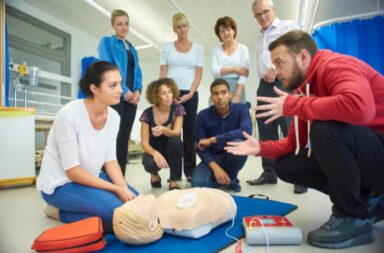Mastering the Art of Response: First Aid for Hypoglycemia
Hypoglycemia, or low blood sugar, can be a challenging situation to navigate. Whether you or someone you know is experiencing symptoms, understanding the first aid measures for hypoglycemia is crucial for maintaining well-being and preventing complications.
1. Recognize the Signs of Hypoglycemia
The first step in providing aid for hypoglycemia is recognizing the signs. Symptoms may include dizziness, shakiness, confusion, irritability, and in severe cases, unconsciousness. Understanding these indicators is vital for a timely response.
Ensure workplace safety by offering comprehensive first aid training for employees. Equip your staff with essential skills to respond effectively to injuries and emergencies.
2. Act Quickly
Hypoglycemia requires prompt action. If you suspect low blood sugar, don’t delay. Begin first aid measures immediately to raise blood sugar levels and prevent the situation from worsening.
3. Offer a Quick-Acting Carbohydrate
A fast-acting source of carbohydrates is essential to raise blood sugar rapidly. Options include glucose tablets, sugar cubes, fruit juice, or regular soda. Administer about 15 grams of carbohydrates, reevaluating symptoms after 15 minutes.
4. Follow Up with a Snack
After the initial carbohydrate boost, it’s crucial to follow up with a more substantial snack to sustain blood sugar levels. Opt for a combination of complex carbohydrates and protein, such as crackers with cheese or a granola bar.
5. Avoid Overcompensating
While it’s essential to address low blood sugar promptly, avoid overcompensating with excessive amounts of sugary foods. This can lead to a subsequent spike in blood sugar levels, creating an unhealthy cycle.
6. Monitor Blood Sugar Levels
If an individual with hypoglycemia has a glucose monitor, use it to check blood sugar levels. This information helps gauge the effectiveness of first aid measures and provides insights for future management.
7. Be Cautious with Unconsciousness
If the person with hypoglycemia becomes unconscious, it’s critical to seek emergency medical assistance immediately. While waiting for help, do not attempt to give them anything to eat or drink to avoid the risk of choking.
8. Inform Healthcare Providers
After managing an episode of hypoglycemia, it’s essential to inform healthcare providers. They can offer guidance on preventive measures, lifestyle adjustments, and potential medication adjustments to minimize future occurrences.
Conclusion: Empowering Response, Preserving Health
First aid for hypoglycemia is a skill that can make a significant impact on the well-being of individuals dealing with low blood sugar. By recognizing the signs, acting promptly, and implementing effective measures, you contribute to the maintenance of balance and health. Stay informed, stay prepared, and let your response be a beacon of support for those navigating the challenges of hypoglycemia.


